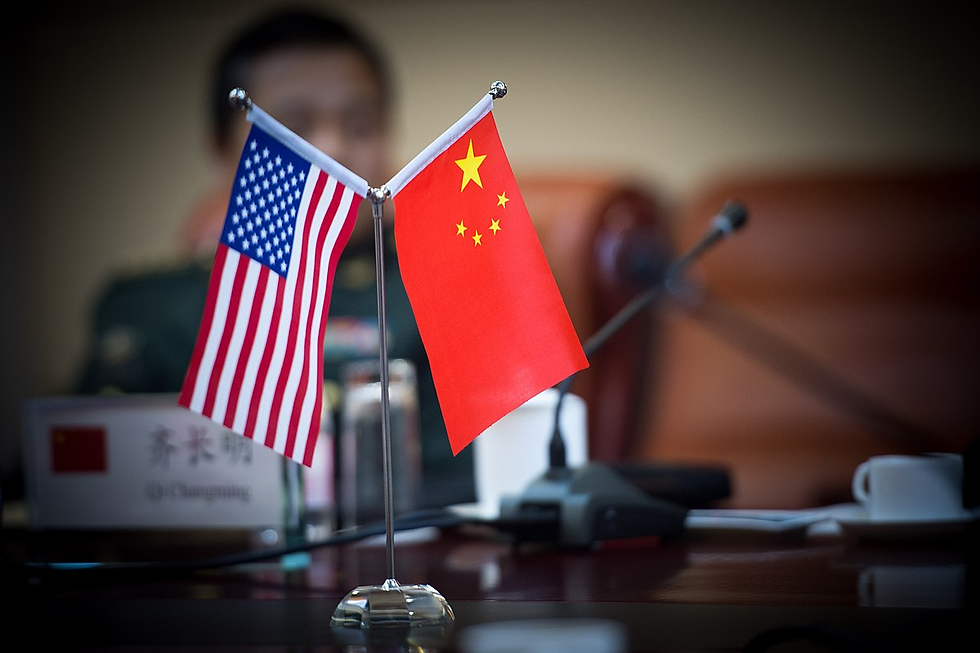China’s Retaliation Against U.S. Trade Sanctions
- Grace Halepsis
- Oct 30, 2024
- 3 min read

Courtesy of Sgt. Mikki Sprenkle, Public domain, via Wikimedia Commons
China has responded to Biden’s new tariffs through a press release and restricted market access to U.S. based companies. The country’s foreign ministry spokesman, Wang Wenbin, defended China’s interests as a market competitor, claiming any economic edge to be a result of comparative advantage.
The tariffs, passed in May of 2024, target $18 billion worth of Chinese imports in an effort to bring attention to American businesses and manufacturers. The Biden Administration cites these installments as necessary to create fair trade practices, claiming China has been “flooding global markets with artificially low-priced exports.” White House statements disclose that Chinese intellectual property mining has created unethical market practices that threaten American economic prosperity.
The new tariffs target a variety of Chinese product imports, including electric vehicles (EV), batteries, semiconductors, and medical items. EV tariffs have seen the most change, jumping from an initial 27.5% to an overwhelming 100%. Critics claim the Biden administration has closed the era of “the gains of lower-cost products over the loss of geographically concentrated manufacturing jobs,” deriving emphasis away from cheap goods and towards American economic sovereignty.
Following the tariffs, China’s commerce ministry issued a press release opposing the trade sanctions and threatening for the immediate correction of the policy. The release questioned the actions of Western countries to limit Chinese production, citing the U.S, EU and Japan as other countries also exporting large amounts of product. The ministry claims the Biden Administration to be worried about economic competition, and is thus looking to “decouple and break links with China,” actions described as “contradictory” to former U.S. bilateral relations. It states how “China will take necessary measures to resolutely defend the interest of Chinese companies.”
The tariffs have inconvenienced members of the US China Business Council, a group of more than 270 American companies that conduct financial interests in China. Members include the CEOs of prominent companies like FedEx and Boeing Global; and while China has reassured foreign businesses of their place within the Chinese economy, U.S. companies still feel restricted from a completely free market.
One source of inconvenience lies in China’s corporate raid patterns, a series of government forced searches in the offices of American corporations. These raids demonstrate a willingness to accuse foreign companies of security violations in retaliation to tariffs. Such behavior forces U.S. international companies into a compromising situation, either facing U.S. tariffs or limits from Chinese government regulations. Raj Subramanium, the US China Business Council’s chairman and FedEx CEO, states his goal is to diminish “long standing and new barriers to China’s market,” and improve the relationship between countries.
While China has only responded to Biden's tariffs through a ministry release— political analysts fear there is more to come. A similar situation arose in 2018, following the election of President Trump, when restrictive tariffs were placed on Chinese imports. These sanctions ushered in an era of Chinese decline in free trade, resulting in more imposed restrictions on U.S. exports. With the Chinese economy contributing greatly to U.S. agricultural exports, American farmers incurred massive losses.
The Trump tariffs also saw extreme political meddling, with China strategically selecting goods to target for maximum campaign impact, often targeting Republican production counties within the U.S. Since the Trump administration, China has placed alternative agricultural imports within the Regional Comprehensive Economic Partnership and the Trans Pacific Partnership, diversifying trade to other countries in an agreement isolated from the U.S. Therefore, Biden’s tariffs may not deliver the intended economic blow to the Chinese economy. To ensure further protections from U.S tariffs, China may also implement policies to temporarily depreciate the yuan, which would undercut global competitors and make Chinese goods more accessible.
While the Biden Administration hopes to strengthen domestic job opportunities and the American economy through Chinese tariffs, these policies have the potential to weaken U.S trade abilities and push China to diversify commerce options. Chinese retaliation to U.S agendas will only worsen with continued restrictions from consecutive administrations, further polarizing the two countries.






Comentarios